Tue 27 Jul 2021
A Book! Movie!! Review by David Vineyard: A. MERRITT – Seven Footprints to Satan // Film (1929).
Posted by Steve under Pulp Fiction , Reviews , Science Fiction & Fantasy , SF & Fantasy films , Silent films[23] Comments
A(BRAHAM) MERRITT – Boni & Liveright, hardcover, 1928. First published as a five-part serial in Argosy Allstory Weekly between July 2 and July 30, 1927. Reprinted many times, both in hardcover and paperback, including Fantastic Novels Magazine, January 1949.
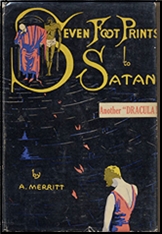
SEVEN FOOTPRINTS TO SATAN. First National, 1929. Thelma Todd, Creighton Hale, Sheldon Lewis. Screenplay by Richard Bee (Benjamin Christensen), based on the novel by Abraham Merritt. Title Cards by William Irish (Cornell Woolrich). Directed by Benjamin Christensen. First released as a silent film and later as a part-talkie.
The club is the Discoverer’s Club in New York, and the uneasy narrator is James Kirkham, adventurer and explorer, who is about to find himself in an urban nightmare out of the Arabian Nights by way of the Twilight Zone, as in short order he will be confronted by his own double and find himself in a deadly real game with a fortune at stake, his soul in peril, and Satan incarnate spinning the wheel.
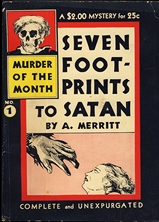
Abraham Merritt is best known as a fantasist and author of scientific romances full of implausible plots, unclad other worldly women, and sensual lush prose pitting his heroes (Merritt heroes always seemed to be falling through mirrors or the equivalent into sensual violent dreams) against strange half worlds and ungodly creations. His best known titles like The Ship of Ishtar, Face in the Abyss, The Moon Pool, and The Metal Monster were highly influential on writers such as Lovecraft, Howard, and Clark Ashton Smith as well as the likes of Fritz Leiber, Henry Kuttner, C. L. Moore, Leigh Brackett, Ray Bradbury, and many more. Merritt also wrote two famous horror novels where crime and the fantastic mixed in Creep Shadow and Burn Witch Burn (which features a cross dressing vengeance obsessed madman who turns living people into murderous dolls and was made into an MGM film with Lionel Barrymore).
I won’t kid you that the plot here is ever plausible, but then neither does Merritt. His saving grace as a writer, beyond his graceful style and vivid imagination, was that he plunged headlong into the swirling madness that confronted his heroes and dragged the reader right with them. Merritt, like Dunsany before him, had a true gift at spinning fancies, terrors, and dreamscapes that were by turns gilded fantasy and soul numbing horrors.
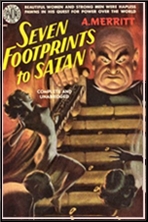
This one is a Gothic nightmare out of the true tradition of Shelley, Lewis, and Mrs. Radcliffe but with a modern pulp sensibility.
In the dark Kirkham encounters a stranger (“I saw a dark, ascetic face, smooth-shaven, the mouth and eyes kindly and the latter a bit weary, as though from study.”) who engages him in a strange conversation:
I looked at him more closely. It was an odd remark, considering that I had unquestionably started out that night for adventure…
“That ferryboat yonder,” he pointed, seemingly unaware of my scrutiny. “It is an argosy of potential adventure. Within it are mute Alexanders, inglorious Caesars and Napoleons, incomplete Jasons each almost able to retrieve some Golden Fleece–yes, and incomplete Helens and Cleopatras, all lacking only one thing to round them out and send them forth to conquer.”
“Lucky for the world they’re incomplete, then,” I laughed. “How long would it be before all these Napoleons and Caesars and Cleopatras and all the rest of them were at each other’s throats — and the whole world on fire?”
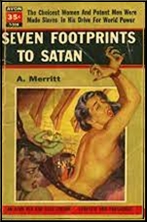
“Never,” he said, very seriously. “Never, that is, if they were under the control of a will and an intellect greater than the sum total of all their wills and intellects. A mind greater than all of them to plan for all of them, a will more powerful than all their wills to force them to carry out those plans exactly as the greater mind had conceived them.”
“The result, sir,” I objected, “would seem to me to be not the super-pirates, super-thieves and super-courtesans you have cited, but super-slaves.”
The curious man is Dr. Consardine and in very short order, he and a beautiful girl who calls herself Eve Walton claim Kirkham is the girl’s mentally unstable sweetheart and virtually kidnap him under the eyes of the police (The game was rigged up against me all the way…), delivering him to a mysterious destination somewhere in Westchester or Long Island (“I saw an immense building that was like some chateau transplanted from the Loire. Lights gleamed brilliantly here and there in wings and turrets.”) where he meets his mysterious host, who knows far more about Kirkham than he should and who finally introduces himself with a strange offer.
“And what I offer you is a chance to rule this world with me — at a price, of course!”
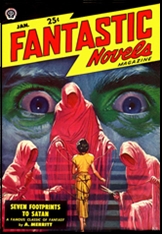
It turns out Eve Walton and others in the employee of Satan are unwilling pawns in his game, an elaborate and hellish game where each individual must wager his life and free will against a promise of fabulous wealth. There are seven shining footprints of Buddha, three are holy, three doom whoever steps on them. Satan has set up an unholy game in an elaborate temple in which the players risk their souls to attain the three holy footsteps that lead to Nirvana on Earth, wealth, wisdom, love, happiness, health … all things men and women will risk their lives for.
Kirkham, ever the gambler, has nothing to lose, but he is playing the game for higher stakes than even Satan imagines. As is usually true with Merritt, the conclusion is no disappointment with retribution, madness, drugged slaves, gunfire, explosions, and madness let lose when Satan overplays his hand.
Seven Footprints to Satan came to the big screen in 1929 under the capable hand of director Benjamin Christensen and with title cards by a young Cornell Woolrich using his William Irish by-line. A well known cast including Thelma Todd and Creighton Hale starred, and the result might have been fascinating because Woolrich certainly knew something about wringing the last ounce of suspense out of purple prose and outlandish nightmare plots — but alas Christensen and the studio decided to make a comedy out of the book in the style of The Cat and the Canary, and the result is a mildly diverting mess that turns out to be a variation on Earl Derr Biggers’ Seven Keys to Baldpate. Without giving that plot away I will only say it is the most annoying in the genre.
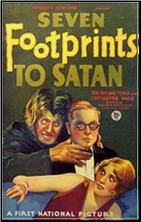
But we have the book, a fine mix of melodrama and terror replete with a satisfying bloody-mindedness where needed, a splendid larger than life villain, clever hero, and enough sheer gall and narrative drive to compel the reader through the unlikely goings on. It is far from Merritt’s best work, but it has its own loony internal logic if you give yourself over to it, and its author writes rings around most of the writers who attempt this kind of fancy.
There are a few unfortunate, mostly mild, problems as with most books of this period, nothing too awful or offensive, but you have been warned. (Merritt is no Sapper or Sidney Horler, thankfully.) It stands as an Arabian filigree of romance, Gothic horrors, dream like qualities, and fancies that asks only that the reader be willing to surrender to it all, and still has its rewards if you do.
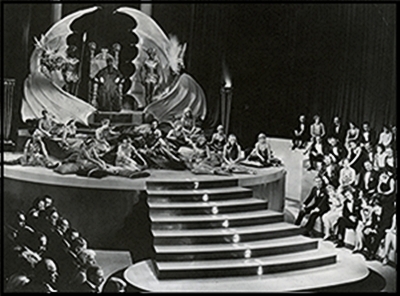
July 28th, 2021 at 12:17 am
Swell review.
I’d include William Hope Hodgson as a horror novelist who writes in this ‘swirling’ style of prose as well. Phantasmagoric, hallucinogenic.
July 28th, 2021 at 12:46 am
What a coincidence. Just this evening I finished laying out an extensive feature on the film version of SEVEN FOOTPRINTS in the upcoming BLOOD ‘N’ THUNDER 2021 ANNUAL, which should be ready to order by this time next week. The piece compares novel to scenario in considerable detail and includes more than a dozen ultra-rare photos, including on-the-set candids of the principal players.
July 28th, 2021 at 11:06 am
Ed, I love coincidences like this, and this is one of the best ones yet. Hope everyone reading this will snap up a copy as soon as it comes out.
July 28th, 2021 at 6:55 am
There are problems in the above review, IMHO.
The director’s first name is Benjamin.
I thoroughly disliked his weird-kinky horror film Haxan (Witchcraft Through the Ages). And have never sought out the rest of his work. So I haven’t seen the film version of SEVEN FOOTPRINTS TO SATAN.
More seriously: Isn’t the novel SEVEN FOOTPRINTS TO SATAN just another racist tale about an Evil Oriental who wants to conquer the world? The (human) villain nicknamed Satan is half-Russian and half-Chinese. (Actually, the book uses a racist term for Chinese).
Why o why, are we still promoting this sort of stuff? Can’t we at long last consign such drivel to toxic waste dumps?
The title comes from the book’s tacky treatment of Buddhism. Can’t we have respect for each other’s religions?
SEVEN FOOTPRINTS TO SATAN does have one virtue, despite all this. It’s an early example of “identity theft” in fiction. This is confined to the opening (Chapters 1-3), before Satan shows up. I’ve cited it a couple of times on my web site, because of this. If I knew of an earlier example of identity theft, I’d be very glad to cite it instead, and stop referring to SEVEN FOOTPRINTS TO SATAN at all.
July 28th, 2021 at 10:08 am
Thanks, Mike. I’ve corrected the director’s first name.
As for the book, I’ve never gotten more than a few pages into it. I know it was quite popular when written, and for many years thereafter, but for me, neither it nor anything else Merritt has written has ever had any appeal. I have left it to others to enjoy, or perhaps not.
July 28th, 2021 at 7:25 am
You covered all the bases on this one,David, and did justice to a charming book and the unique film that sprung from it.
July 28th, 2021 at 9:20 am
It’s been so long since I read it (a 1963 Avon pb reprinting, shiny new, in a nondescript cover) that I’d pretty much forgotten all the details. It was one of the few Merritts that I was able to slug all the way through. Moore/Kuttner’s and Hannes Bok’s pastiches of Merritt are miles better than the real thing.
July 28th, 2021 at 11:09 am
Fred, Glad you mentioned the 1963 paperback, which I remember buying (but never reading) at the time. This adds to my contention that Merritt was still popular then. What I don’t know is how often he’s still read today.
July 28th, 2021 at 11:21 am
Steve, I’ve had the same problems with Merritt’s murky prose that you’ve experienced. I managed to read a couple of Merritt’s books but I’m not eager to repeat the encounters.
July 28th, 2021 at 12:41 pm
Here’s my review of the novel, which I liked for the most part, and found interesting in its possible influence on other authors. That’s pure speculation on my part, of course. Also assorted cover scans!
https://jamesreasoner.blogspot.com/2021/01/forgotten-books-seven-footprints-to.html
July 28th, 2021 at 6:11 pm
Thanks for the link, James. I don’t remember this particular review from your blog, but now that I’ve seen it, I found it very interesting, especially the covers and the speculation as to what other writers Merritt may have been the inspiration for.
July 28th, 2021 at 8:35 pm
Steve, just one bit here, and if you want to remove it I understand.
If Steve does not want a book I review covered on here he will tell me. Expressing an opinion is one thing, dictating or trying to dictate what I can write about by anyone else is quite something else.
I didn’t notice we had reached the point where discussing a flawed book from the past was open to the implication of racism or cultural insensitivity on here, but if I am to be lectured on it at least let someone from the race open to offense do it.
I have Black friends, including prominent Science Fiction writers, who are fans of Edgar Rice Burroughs, does that mean I get to write about Tarzan? I know Asian scholars who have written redeeming articles about Charlie Chan and Fu Manchu, are they all right?
Do I have to give up Shakespeare and Dickens because of the Merchant and Fagin, or I just can’t write about them here?
Holding the past to the standards of modern literature isn’t going to leave us with much.
I read this at the uncritical age of 16 in a different time. Rereading it the book was less flawed in that way than I expected, and I’m sorry, but if half Russian half Chinese villains must be banished form all modern reading and appropriation is thrown around every time a writer uses some aspect of another culture pretty much 90% of popular fiction including Conan Doyle, Sayers, Chandler, and Hammett are out the door.
Chandler was a racist and homophobe, I’ll still read and write about him. Hammett was a Stalinist apologist long after it was possible to be so without great hypocrisy, but I will still read and write about him.
I thought we were discussing books here among adults, not a middle school classroom, and it is possible to disagree with me, as many on here did about reading Merritt without the implication that I am somehow a racist because I reviewed a flawed work from the past and found it had, pardon the pun, merit.
I welcome discussion, but I will not be dictated to unless I violate Steve’s rules on his Blog unless certain people on here are planning to issue and approved list of titles we are allowed to review.
July 28th, 2021 at 8:54 pm
Subject to further thought about it on my part, and without saying more, I’m going to let the review, Mike’s comment, and David’s reply all stand.
July 28th, 2021 at 10:36 pm
I myself would only have realized from the astute commentaries above that there are political issues associated with this long-dormant novelist.
I would never feel threatened by such an author, but I now see it’s more sensitive than I took in at first glance.
Privately, what I feel is this: let me make up my own mind. Howsoever despicable an author might be, ‘let me decide’ rather than omit him from my access. Don’t redact any writer from literary history. It makes me uneasy to have such decisions made for me.
A good example is Sax Rohmer. I assume anyone in the modern world readily perceives the wrong-headedness underlying some of Rohmer’s writing. Yet, he was a big influence on today’s popculture. Isn’t it always better to know why and where someone erred, than to omit this understanding? Isn’t it better for us to talk about why he was wrong than to remove him?
Any comment I make in this fine forum can be removed without resentment on my part. I am a guest.
July 28th, 2021 at 10:44 pm
I am against censorship, period. I hope we don’t see the cancel culture nonsense on Mystery File because then we would not be able to discuss many pulp fiction stories from the teens, twenties, thirties, and forties. Same with much of the vintage paperback fiction.
I try to judge fiction by literary standards and my own personal likes and dislikes. I try not to get into passing judgement on the beliefs of prior decades because who the hell are we to lecture? The future will judge many of our beliefs as nonsense.
Especially with pulp fiction, let’s leave out the censorship and cancel culture hogwash. We may not believe in their standards but we still can enjoy the fiction.
July 30th, 2021 at 2:20 pm
Down the line I am thinking of reviewing a Sydney Horler book. Horler, for those lucky enough not to know him, was an absolutely horrible man, jingoist, misogynist, sexist, racist, name an “ist” and it probably fits Horler.
Historically though he is fairly important to the Thriller genre, particularly the British version. After the big names like Sapper, Buchan, Wallace, and Yates Horler is at the top 0f the second string of major writers, a man who sold tons of books that were consumed by millions of readers and copied by later better writers despite his flaws as a man and a writer.
And despite those flaws some of his books do show why for all their sins, with a certain amount of critical remove, it is possible to see why a book like THE CURSE OF DOONE was still famous enough to get reprinted in the Sixties.
With a cooler head let me reassure everyone I understand how some works can trigger some people and I do try to warn when a work falls in that category, but in fiction in general, and popular fiction in particular, I belive it is vital to deal with such works by figures who were once important writers.
The modern spy novel, Graham Greene, Eric Ambler, and John Le Carre, does not exist without John Buchan. Whole genres only exist and thrive because of writers like Merritt, Lovecraft, Howard, and Burroughs. In mainstream literature writers like Celene, Genet, Camus, and Pound are more than problematic as human beings, but we ignore their work at our own peril and to our own loss.
While it is the responsibility of modern writers to address their audience and find ways to tell stories without repeating the mistakes of the past, you can’t build without a foundation, and in terms of art the foundation tends to be flawed.
I understand the Puritan instinct, but it is as often as not as destructive as the sins it is trying to repress.
I tend to believe it is better to shine a light than try to bury the past, to applaud the good and face the bad and deal with it rather than hide our collective heads and pretend it never happened.
In SNOBBERY WITH VIOLENCE Colin Watson discusses that writers like Horler and Sapper and even Sayers were not advocating hate, they were merely repeating the prejudices of their largely middle class readers. It would be nice if instead of merely aping their readers prejudice they had challenged them, but honestly, how many popular writers today are actually challenging the prejudices of their readers?
The tricky thing about holding the world to your standards is eventually the world will pass you by and hold you to theirs.
You reach a point very quickly that resembles a kind of literary fascism. It’s not a far stretch from condemning people for reviewing books to actually building bonfires and burning them (this is a general discussion not aimed at anyone on here). This kind of cultural puritanism goes south very fast and it goes in all sorts of harmful directions the people pushing it don’t expect so that their particular favorite ox is soon gored as well.
Or do we react like Ian Fleming, who after drawing some criticism for his Chinese German villain Doctor No, made Goldfinger and Ernst Stavro Blofield Swiss to avoid the problem?
July 30th, 2021 at 3:14 pm
A two word reply:
Well said, David.
July 30th, 2021 at 7:06 pm
I’ve never read Horler or Sapper.
But I have read Sayers. Unfortunately IMHO she was indeed advocating hate.
Sayers was a first rate literary talent. She always knew exactly what she was saying. She was relentless about including racial slurs in her novels. She knew exactly what she was doing.
I think A. Merritt was advocating hate in SEVEN FOOTPRINTS TO SATAN too.
Let’s give these professional writers credit. The pro Civil Rights ones like Ellery Queen and Rex Stout and Patricia McGerr and Dorothy Cameron Disney and the Lockridges knew what they wrote. So did the racists like Sayers and Merritt.
This situation is a mess. But ignoring what actually is on the page is no way to solve the problem.
There are 100, 000 books in Al Hubin’s crime fiction bibliography.
Most have no racial prejudice whatsoever. And a Good Thing, too!
I intend to concentrate my critical career, for what little time I have left, on writers who loved their fellow man, and who tried to do good.
David Vineyard makes good points, about it not being my place to tell him what to write or who to review. He makes sense.
Only my own writing is my concern.
Ronald A. Knox, leading British detective writer, made a famous Ten Commandments for Detective Fiction, in 1929. One of them was to NOT use Chinese villains in books.
I’m trying to live up to the standards of 1929!
I know this sounds advanced and radical.
July 30th, 2021 at 7:35 pm
Points also well made. Thanks, Mike!
July 30th, 2021 at 10:50 pm
Thanks Mike, I knew we could discuss this civilly.
I really see nothing in Merritt that suggests he was anything but a man of his time, but in the case of Horler we have his infamous letters to the TIMES OF LONDON that reflect just how much hate he directed toward others.
Georges Simenon and P. G. Wodehouse only just escaped being accused of collaboration (treason in Wodehouse case) during WW II (Simenon because it turned out he was protecting a Jewish mistress and Wodehouse only because of his wife’s outspoken anti Nazi positions while they lived in France during the Occupation). Wodehouse lived in exile the rest of his life though his work was still published and there were multiple adaptations of it on British television.
I find that much more problematic than anything by a Lovecraft or even Horler which was just talk, but again I’m not willing to disgard either writer for it. I’m afraid genius and unpleasantness often goes together. The painter Caravaggio was probably a murderer.
Even today there are writers, some of them major bestsellers, beloved by readers across the political spectrum whose politics I have to take with a grain of salt if their other views are more acceptable.
But what I will never do is dismiss how anyone feels about what they read. If something makes a work inaccessible to you then that is your reaction and your right. I just think a differing view about the literary merit of that work has to have equal right to be aired within the bounds of decency and good taste.
July 31st, 2021 at 10:17 am
Two thoughts.
I believe that A, Merritt kept changing the ethnicity of the villain in The Moon Pool between German and Russian depending on the political climate when a particular edition was issued.
I read 2 or 3 of Vince Flynn’s early thrillers, which I liked at first, but his politics kept getting more odious. As I recall, one of the books involved the murders of one or more Supreme Court Justices and the attempted assassinations of other politicians. At the end of the books the cabal responsible was identified and their motivations discussed. The upshot was that everyone decided that the victims “probably deserved it but don’t do it again.”
I found this seriously disgusting so I vowed never to read an other book by him, even though he went on to be a best-selling author. I suspect that future generations will find his books as retroactively disturbing as we now find Horler’s.
August 3rd, 2021 at 12:52 am
I never knew there was a film version of this book!
Many thanks for the review and for putting a spotlight on a book and an author who should be better known.
August 6th, 2021 at 9:54 pm
The BLOOD ‘N’ THUNDER 2021 ANNUAL, with my article on the making of the 1929 film adaptation of SEVEN FOOTPRINTS TO SATAN, is now available. It contains several other pieces that would be of interest to M*F readers, I think. For a detailed list of contents and easy ordering, just click on https://muraniapress.com/book/blood-n-thunder-2021-annual/